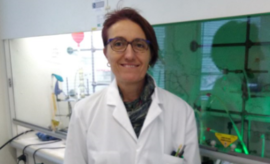A molecule developed by Abivax from research conducted at Institut Curie presents promising results for its Phase 2a trial

Abivax, a biopharmaceutical company created through a collaboration between Institut Curie and the Institut de Génétique Moléculaire de Montpellier (IGMM), has just announced positive results for its Phase 2a clinical trial of its molecule ABX464 in rheumatoid arthritis. The company specializes in the development of new drugs that modulate the immune system to treat inflammatory diseases, viral diseases and cancer.
Towards more effective treatments for chronic inflammatory diseases?
Abivax's most advanced molecule ABX464 is a potent anti-inflammatory agent capable of modulating the synthesis of certain DNA. This unique mechanism of action makes it a potential new treatment of choice for patients with severe chronic inflammatory diseases, where there remains a major need for well-tolerated and effective long-term therapeutic solutions.
The company announced promising results from its Phase 2a maintenance trial evaluating the rate of continued efficacy of ABX464 in the treatment of rheumatoid arthritis. This chronic inflammatory autoimmune disease, whose number of diagnosed cases has been estimated at nearly 4 million in 2021, causes significant joint pain that can become disabling over time.
Among the 40 patients who received a daily 50mg dose of ABX464 for one year, 58% showed a favorable clinical response with a significant improvement in their quality of life (reduction in joint pain, number of synovitis[1], etc.). These results are very promising, as Prof. Hartmut J. Ehrlich, CEO of Abivax, explains:
These results clearly support the continued clinical development of ABX464 for the treatment of RA. Furthermore, they are consistent with the data generated in our phase 2a and 2b ulcerative colitis[2] trials and suggest that ABX464 has the capacity to address a broad range of chronic inflammatory indications, a disease field with a persistent high medical need and with millions of patients waiting for new, safe drugs with durable efficacy.
ABX464: a molecule born in the laboratories of Institut Curie
It is particularly gratifying to see this molecule, which was developed in Institut Curie laboratories, show such promise for the treatment of chronic inflammatory diseases. These extremely encouraging results suggest that ABX464 has the potential to be a real therapeutic breakthrough for these indications with a very high medical need,
rejoices Dr. Florence Mahuteau-Betzer, CNRS research director, at the head of Institut Curie's chemical library from which ABX464 was originally derived. Initially named Splicos, Abivax was created in 2009 based on the results of a screening[3] of this collection of small molecules, which contains more than 10,000 substances that allow for high-throughput testing of drug candidates and the identification of so-called "hit"[4] molecules. ABX464 was designed and synthesized by optimizing the hits from the initial screening.
Since its creation, Abivax has been developing drugs under license from Institut Curie, CNRS and the University of Montpellier, based on a portfolio of more than 20 patents, several of which were co-developed with Institut Curie teams.
The progress of this company, whose flagship product is the result of the work of CNRS researchers at Institut Curie and the IGMM, illustrates the importance of valorizing research and continuing to collaborate with companies to give our innovations every chance of reaching patients.
concludes Dr. Cécile Campagne, Director of Institut Curie’s Technology Transfer Office and Deputy Director of Carnot Curie Cancer.
[1] Inflammation of the synovial membrane. This membrane lines the joints and secretes a liquid whose function is to facilitate joint sliding and shock absorption.
[2] Chronic inflammation of the intestinal mucosa present in the rectum and extending, in most cases and continuously, over part or all of the colon.
[3] In the academic world, screening facilitates the discovery of molecules with potential therapeutic applications.
[4] Primary screening identifies molecules with significant activity, called "hits". These molecules are tested again, during a secondary screening, to confirm and refine their activities.


